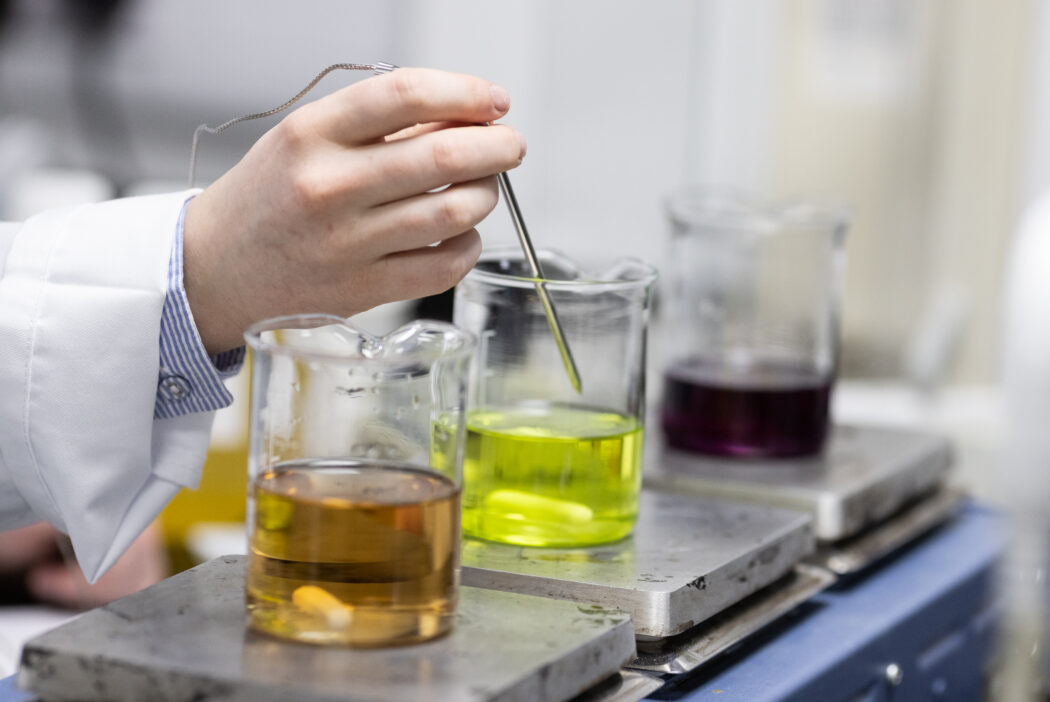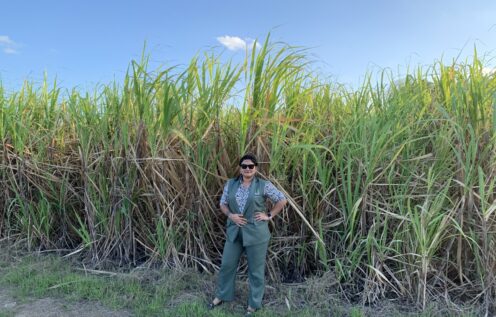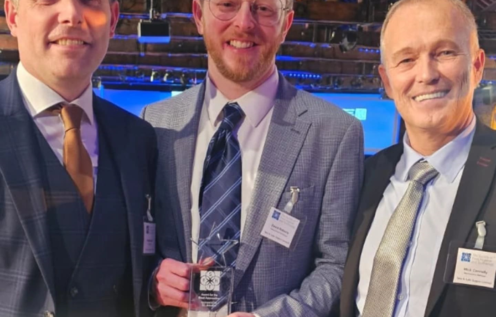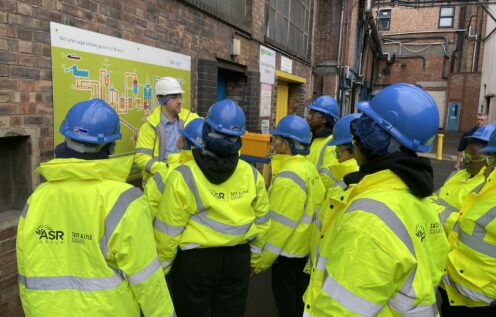08/03/2023 Case study
Celebrating the accomplishments of women
Each year on March 8th, International Women’s Day offers a valuable occasion to celebrate the accomplishments of women at Tate & Lyle Sugars and worldwide while also increasing their visibility. It also presents an opportunity to encourage everyone to take action to help build an inclusive world that values and embraces diverse backgrounds, perspectives, and talents.
In the spirit of celebrating accomplishments and increasing women’s visibility, we interviewed our colleague Natalie Mayer. Natalie, who joined Tate & Lyle Sugars in 2017, is a member of the Research & Technology (R&T) team. Most of her days are spent in our R&T laboratory, where she investigates how sugars behave and how we might improve packing performance, optimise a recipe or develop a new test method.
In 2019, Natalie trained as a Mental Health First Aider which she’s passionate about. She believes it’s important to normalise discussions about mental health issues before they become overwhelming.
Hi Natalie, please tell us about yourself 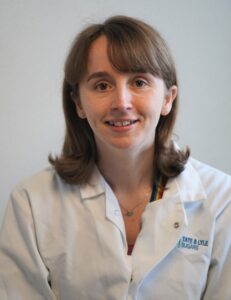
I’m Natalie, I’m a Research Technologist at Tate & Lyle Sugars’ Thames Refinery with an interest in solving technical problems, and I’m also a Mental Health First Aider. I organise an office bake off competition for charity twice a year, which to date has raised nearly £2500 for various charities! Outside of work, I love making handmade cards (search NataliesCardDesigns on Etsy or Instagram!), have a passion for fossil hunting and palaeontology, play the piano and have recently started crocheting.
Please can you tell us about your journey in to a scientific role
I knew from about age 13 that I wanted to work in a lab, but I took a slightly less conventional route into science because I didn’t go to university – I started work at age 18 as a Pharmacy Assistant Technical Officer in the pharmacy manufacturing unit at the Royal London Hospital. I then moved onto a job solving problems and providing technical support in the printing ink industry with Sun Chemical, then, when my site closed down in 2017, I joined Tate & Lyle.
Tell us about your work in the laboratory
I am in the lab most days; we have a number of exciting instruments to help me understand how our sugars behave. Most of my work is around final products – whether that’s working out how to improve packing performance, optimising a recipe or developing a new test method. Sugars are a surprisingly complicated material to work with, so using my conclusions from the lab to suggest improvements at full-scale production can save a lot of time and money in the long run. My team are a corporate function so we support all the ASR Group sites around the world – this makes for a really varied set of challenges to overcome, and makes the work day really interesting. I am also completing an apprenticeship to become a Six Sigma Black Belt, as I have developed an interest in statistics and Continuous Improvement.
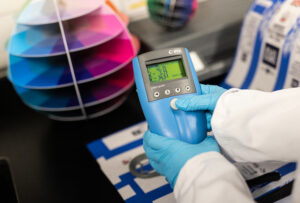
Can you describe your experience as a woman working in a scientific field?
I am glad to say that I personally have never felt any negativity from people as a woman working in the science sector. It is undeniable that there are more males than females in science and engineering roles, but it does tend to differ by department, at least at Tate & Lyle. I have been in meetings where I have noticed that I’m the only woman out of 7 or 8 attendees, but that makes me proud that I’m there, rather than doubt my capabilities. I do believe there has been a shift in recent years, and more women are becoming engineers and scientists, so hopefully that will continue in the future.
How did you become involved in the company’s work to improve our colleagues’ mental health?
In 2019, my boss forwarded me a link to the Mental Health First Aid training as she knew I had a passion for sharing tips about wellbeing, and thought it would give me more of a platform to be able to do this. I once mentioned to 2 colleagues that I’d been feeling a bit off recently, and both of them said ‘me too’ – they would never have told me that if I hadn’t opened up to them first, so I believe that a lot of people are struggling on their own, thinking there’s no one out there who will listen. People are at the heart of everything, and if people are happy and feel looked after, they will do their best work.
To me it’s a no-brainer that mental health and work productivity are linked.
What is Mental Health First Aid, and how does it differ from traditional first aid?
When I first heard about Mental Health First Aid, I assumed it would be mainly around suicide prevention – helping people when there is an immediate risk to life – but there are actually 3 main areas within MHFA: Trying to prevent people who don’t currently have a mental health condition from developing one, helping those who do have a diagnosable condition and preventing them getting worse, and generally promoting good wellbeing. We are not medical professionals – we don’t diagnose people, but we want to signpost people towards support which is appropriate for them, and provide a listening ear when needed.
How you prioritize and balance your work in both science and mental health?
I’m really lucky to work in a role where I can contribute to cultural activities as well as doing my normal day job. With mental health conversations, there is normally an urgency to them, so part of being a Mental Health First Aider (MHFA) involves putting the day job on hold to deal with a person in crisis, but being able to know when you’re spending too much time with someone. The point of MHFA is to be there for someone, but share organisations who will be better placed to help them in the long run. I’ve found it really helps to be flexible when it comes to science too – you can plan your day to perfection but then an urgent issue will come along and you have to drop everything!
How can Mental Health First Aid training help reduce stigma around mental health issues and promote more open and supportive conversations about mental health?
One thing I have discovered through MHFA is the Wellness Action Plan (WAP) which has been developed by Mind. A WAP is a document filled out by you and discussed confidentially with your manager – its aim is to keep everyone mentally healthy at work. It asks you things like ‘what causes you to have poor mental health at work’ (and if there’s anything your manager can do about it), ‘how can your manager help you stay mentally healthy’, and any early warning signs that your manager can pick up on if you’re struggling. I think this is such a valuable document, whether you have a mental health condition or not – we’re all unique and have different needs, and any way we can be more comfortable at work can only be a good thing for your productivity. These documents can be found on Mind’s website here – Home – Mind
What advice would you give to young women who are interested in pursuing careers in science?
Follow your dreams! There’s no reason why you can’t be a scientist or engineer. Someone once told me that skills can be taught, but the attitude can’t be – I thought that was really powerful, so make sure you’re not afraid to share your enthusiasm and true personality in situations like interviews. Don’t expect to know everything straight away and don’t be afraid to ask for help if you’re unsure. If you’re not interested in going to university, it is possible to get a good job in science, but it won’t be easy – be prepared to start from the bottom and work your way up every time you get a new job (particularly in the early days). Try and say ‘yes’ to every opportunity you can – sometimes all you need is a foot in the door somewhere, then you can start to prove yourself.
